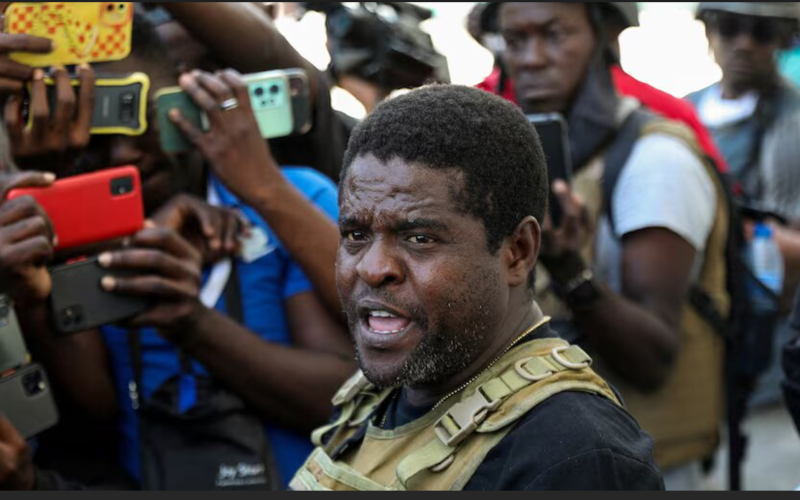PORT-AU-PRINCE (Reuters) — A powerful gang leader in Haiti has issued a threatening message aimed at political leaders who would participate in a planned transition council, as fires broke out amid a fresh surge of violence in the Caribbean nation’s capital.
Nearby countries bolstered their border security and withdrew staff from embassies while plans to send a long-awaited international security force remain uncertain.
After unpopular Prime Minister Ariel Henry announced on Monday he would step down once the council was in place, the capital, Port-au-Prince, was initially quieter, but violence appeared to be flaring up again as of late Wednesday, with a shootout in one neighborhood and an attack on the police academy early on Thursday.
A fire broke out at the main penitentiary, emptied of prisoners by armed men earlier this month. Thick black smoke earlier billowed out from the facility, but the fire appeared to be out by Thursday afternoon, when local media showed heavily armed police entering the partially blackened site filled with mounds of trash.
Reuters could not immediately establish if any people had remained in the jail or what sparked the blaze.
A police union said the national police chief Frantz Elbe’s house had also been set on fire on Thursday. It did not say whether anyone had been hurt or give details on Elbe’s whereabouts.
Haiti is struggling to resolve a long-running political and humanitarian crisis. Heavily armed gangs have taken over much of the capital, and rights groups have reported widespread killings, kidnappings and sexual violence. Hundreds of thousands of people have been displaced.
Henry, who was never elected, had been appointed prime minister by President Jovenel Moise in 2021, shortly before Moise was assassinated. Henry repeatedly postponed elections.
The comments from gang alliance head Jimmy “Barbeque” Cherizier were recorded on Wednesday and distributed via a rambling seven-minute audio message widely shared on Thursday morning on messaging platform WhatsApp.
“Don’t you have any shame?” said Cherizier, directing his remarks at politicians who he said were looking to join the council. “You have taken the country where it is today. You have no idea what will happen,” he added.
“I’ll know if your kids are in Haiti, if your wives are in Haiti … if your husbands are in Haiti,” he said in an apparent threat to their families. “If you’re gonna run the country all your family ought to be there.”
In his remarks, Cherizier said the resignation of Henry was only “a first step in the battle” for the island nation of around 11 million.
Haiti’s government again extended a nightly curfew through Sunday, in an order signed by acting Prime Minister Michel Boisvert. Henry has been stranded abroad since trying to return from a trip to Kenya to secure support for a security mission.
Regional bloc CARICOM has detailed the political parties and other social sectors set to make up the nine-member transition council that will take over from Henry. Negotiations over the council were brokered by Caribbean leaders and U.S. Secretary of State Antony Blinken, but formal appointments are yet to be made.
On Wednesday, the leader of a party declined an offer of a voting member of the council, backing instead an alternate three-member transition council that would empower former coup leader Guy Philippe, who was recently imprisoned in the United States and is seeking an amnesty for gang leaders.
EMBASSY REDUCTIONS
With Haiti’s political future in limbo and the timing of the long-delayed Kenyan-led security mission unclear, the already sparse international presence in Haiti has been further receding.
Canada announced a reduction to its embassy staff that will leave only essential employees in the country, and said the embassy was temporarily closed to the public. That follows similar drawdowns by the United Nations and at the U.S. embassy.
The country’s main cargo port said that despite military reinforcements, it would not receive vessels until further notice, as it assesses damages to containers and infrastructure.
Major passenger cruise line Royal Caribbean Group also suspended for a week its regular visits to Labadee, its private resort in northern Haiti.
Fearing a spread of instability in the region, Britain said it was bolstering security in the Turks and Caicos Islands, an overseas territory, as did the governor of the U.S. state of Florida. The Dominican Republic, which shares the island of Hispaniola with Haiti, closed its shared border with Haiti last year and has regularly deported Haitians.
The U.S. southeast coast guard said, “At this time, irregular migration flows through the Caribbean remain low.”
Dominican media reported that aviation authorities in a press conference rejected a U.N. statement claiming that an airbridge would be set up from the country to bring humanitarian aid to Haiti, maintaining the airspace would remain closed.
Aid group Mercy Corps said Port-au-Prince residents were being reduced to “forced nomads,” seeking refuge from shootings in temporary shelters with family or strangers and battling constant uncertainty, food shortages, trauma, illness and overcrowding.
Marie Love Elucien, 25, who lost her home and shop due to gangs, told Mercy Corps that she was most afraid for her young daughter: “I’m worried she’s going to have a fit and become paralyzed because every time she hears the shots she jumps and screams.
“She cries incessantly and no one can touch her; she becomes hysterical and uncontrollable,” she said.
More than 360,000 people are internally displaced in Haiti, according to U.N. estimates.
Gina Antoine, a 43-year-old pregnant mother of three, told Mercy Corps that she was exhausted from moving between neighborhoods and could not run anymore.
“We face inhumane situations daily, walking among corpses. Gangs can attack at any moment,” she said. “I have nowhere else to go. I wish everything could return to normal.”
Reporting by Harold Isaac in Port-au-Prince; Additional reporting by Sarah Morland in Mexico City, David Ljunggren in Ottawa and Deborah Sophia in Bengaluru; Writing by David Alire Garcia and Sarah Morland; Editing by Rosalba O’Brien and Leslie Adler
Our Standards: The Thomson Reuters Trust Principles

